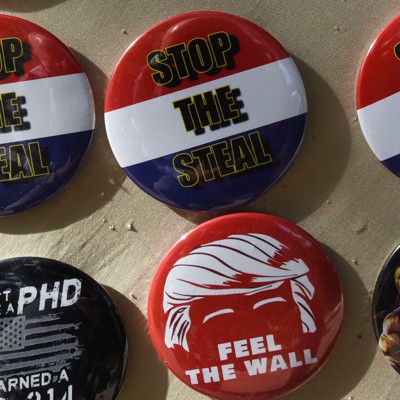Bracing for the Fraud Claims Expected After Election Day

Election rumors and misinformation could spread more rapidly in the coming weeks than they did in the period after the 2020 presidential election, according to a report from the University of Washington’s Center for an Informed Public.
As Nov. 8 approaches, researchers predict that there will be a flurry of rumors, misinformation and conspiracy theories on Election Day and beyond, similar to 2020. But this year, the people engaging in those narratives are better organized, more connected, and already deeply familiar with election fraud claims.
“The audiences are already primed just from all that happened in 2020,” Kate Starbird, a professor at the University of Washington and co-founder of the Center for an Informed Public, said during a call with reporters on Friday.
Researchers have repeatedly found that voter fraud across the U.S. is extremely rare and that the nation’s elections have a high degree of integrity. Even so, claims to the contrary have flourished in recent years, stoked in part by former President Donald Trump.
From “SharpieGate” in Arizona—where some voters believed using the felt-tipped markers invalidated their ballots—to suspicions over alleged suitcases full of illegal ballots in Georgia, election and voter fraud narratives were widespread in 2020. While these claims were found to be false, concerns of this sort haven’t gone away.
“The same sort of narratives that we saw in 2020, we expect to see a lot of them again this time,” Mike Caulfield, a researcher with the University of Washington’s Center for an Informed Public and the report’s primary author, said on the call.
On Election Day itself, researchers expect people will be at the polls collecting what they believe to be evidence of flaws or misdeeds with how elections are being conducted. That might include taking photos or videos of processes at polling stations.
Then, in the days and weeks after the election, people will share that “evidence” to support fraud claims. Some of these narratives could appear on mainstream online platforms. But it’s more likely they’ll gain traction in corners of the internet like Truth Social, where Trump posts, and Telegram, the report said.
“The people who are going out to collect evidence are more networked,” Caulfield said. “There’s been a cottage industry of this stuff for two years, and so that’s going to be a much more organized, a much more directed space than maybe it was in 2020.”
Election fraud narratives typically fall within three categories, Caulfield explained.
First, there are allegations that there was election fraud on a scale great enough to affect results.
Second, that there is an interested party trying to cover up that fraud.
And lastly, that some authoritative figure has the power to intervene in election processes. An example of this would be in 2020 when people were claiming then-Vice President Mike Pence could overturn the election results.
It’s difficult to predict just how people will respond to election rumors and misinformation this year or whether it could lead to violence, researchers said.
“We have gone through two years of a lot of people tuning in daily to the new theory about this, the new piece of evidence [for that]. And that’s going to have an effect,” Caulfield said. “It’s difficult to say what effect.”

